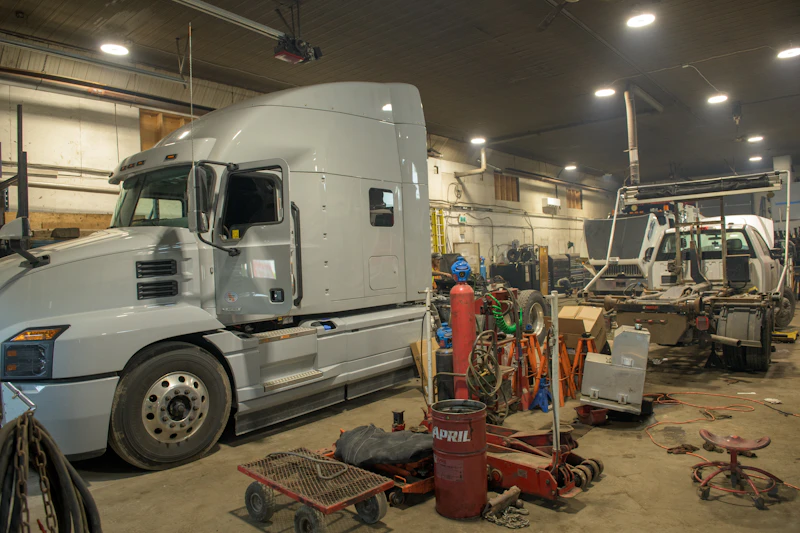Preventive Truck Maintenance Tips For Winters

Winter is a tough time for truckers, as they must operate their vehicles in extremely cold temperatures and hazardous weather conditions. With this in mind, preventive truck maintenance is critical for ensuring that the truck performs safely and efficiently during the cold months. Here are some tips for winter truck maintenance:
Check your tires
Winter puts additional strain on tires due to icy roads and slushy conditions. Make sure to check your tires for proper inflation and tread depth. If your tire tread is too worn, replace them. Consider investing in winter-specific tires if you’ll be driving in more extreme conditions.
To make truck tires ready for winter, there are several steps you can take to ensure your tires are in good condition and able to handle the harsh winter weather.
- Check the tread depth: The tread on your tires is what provides traction on the road. It's important to check the tread depth to ensure that the tires have enough tread to grip the road in snowy and icy conditions. The minimum legal tread depth in the US is 2/32 inches. If the tread is less than that, it's time to replace your tires.
- Check the tire pressure: Cold temperatures can cause the air in your tires to contract, which can lead to underinflation. This can affect the tire's ability to grip the road and can also lead to uneven wear on the tires. Before the winter season, check the tire pressure and inflate the tires to the recommended pressure levels.
- Balance and align the tires: Properly balanced and aligned tires will help with handling and stability on the road. A wheel alignment should be done every two years or whenever you notice that your truck is pulling to one side or the other.
- Rotate the tires: Rotating your tires regularly can help with even wear and extend the life of your tires. Tires should be rotated every 6,000 to 8,000 miles or at least twice a year.
- Consider winter tires: If you live in an area that experiences harsh winter weather, it may be beneficial to consider investing in winter tires. Winter tires are specifically designed to handle the colder temperatures and snowy conditions of the winter season. They have a special rubber compound that remains flexible in cold temperatures, and they also have a deeper tread pattern to improve traction on snow and ice.
- Check for damage or wear: Before the winter season, it's important to check your tires for any damage or wear. Look for cuts, bulges, or any other signs of damage. If you notice any issues, it's best to get them checked by a professional.
By following these steps, you can ensure that your truck tires are ready for the winter season and that you are prepared to handle harsh weather conditions. Remember that it's also important to drive safely and cautiously in winter weather, and to adjust your driving habits accordingly.
Inspect your brakes
Brakes get worn down more quickly in winter months due to snow and ice. Make sure to have your brakes inspected and tested by a professional, if necessary. If your brakes are worn down, replace them before the winter weather sets in.
Change your oil
It’s important to change your oil at least once a year, or every 5,000 miles. In the winter, it’s especially important to use a high-quality oil that won’t freeze in cold weather. If you don’t have a clear idea of which oil to be used during the winter season, you may think about seeking the assistance of a heavy-duty truck maintenance shop out there. Then you will be able to receive appropriate recommendations.
Check your lights
Make sure your headlights, brake lights, and signal lights are working properly. You’ll need to be able to see in the dark and be seen by other drivers. If you want to ensure the safety of your truck during the winter season, it is quite important to check the lights. Then you will be able to drive the truck during dark light conditions with maximum safety.
Check your battery
Cold weather can strain your truck’s battery, so make sure to check the battery’s voltage and make sure it’s at the right level. If your battery has been in service for two or more years, you should consider replacing it.
Check your hoses and belts
Make sure to inspect your hoses and belts for any cracks or leaks. If any of them are worn, replace them before the cold weather sets in.
Inspect your windshield wipers
Make sure your windshield wipers are in good condition and are able to clear away snow and ice. If they’re worn, replace them before the winter weather sets in.
Inspect your windshield washer fluid
Make sure to have enough windshield washer fluid in your truck. This will help keep your windshield clear when snow and ice are on the road.
Check your defroster
Make sure your defroster is working properly and can clear away fog and condensation from your windshield. This is one of the most important checks that you will have to do in your truck before taking it out during the winter season. It can also be a lifesaver for you.
Stock up on emergency supplies
Make sure to keep an emergency kit in your truck. This should include items such as a flashlight, first-aid kit, blankets, and snacks.
Final words
By following these truck maintenance tips, you can ensure that your truck is prepared to handle the winter months. Be sure to check with a professional mechanic if you have any questions or doubts about the condition of your truck in the winter.

.webp)

.webp)